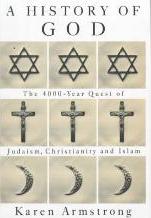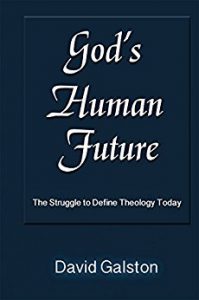 “A History of God” by Karen Armstrong, author of “The Case for God”
“A History of God” by Karen Armstrong, author of “The Case for God”- “God’s Human Future: the struggle to define theology today” by David Galston
1. A History of God
Karen Armstrong is one of the world’s leading commentators on religious affairs. She spent years as a Roman Catholic nun in the 1960s, but then left her teaching order in 1969 to read English at St Anne’s College, Oxford. In 1982, she became a fulltime writer and broadcaster. She is a best-selling author of over 15 books. An accomplished writer and passionate campaigner for religious liberty, Armstrong has addressed members of the United States Congress and the Senate, has participated in the World Economic Forum, and in 2005, was appointed by Kofi Annan to take part in the United Nations initiative ‘The Alliance of Civilisations’. In 2008 she was awarded the Franklin J Roosevelt Four Freedoms Medal for her work on religious liberty.
“Indeed, our current secularism is an entirely new experiment, unprecedented in human history. We have yet to see how it will work. It is also true to say that our Western liberal humanism is not something that comes naturally to us; like an appreciation of art and poetry, it has to be cultivated. Humanism is itself a religion without God – not all religions, of course are theistic. Our ethical secular ideal has its own disciplines of mind and heart and gives people the means of finding faith in the ultimate meaning of human life that were once provided by the more conventional religions” (Armstrong)
Her description of the 4000 year history of God from Abraham to the present day makes for easy and interesting reading and challenges at all points. She is both reverent and curious and ultimately discusses the question: Does God have a future? Which is the subject of our next text ….. This is a big book but held my interest all the way.
- God’s Human Future
David Galston is a University Chaplain and Adjunct Professor of Philosophy at Brock University in St Catharines, Ontario, Academic Director at Westar Institute, a regular speaker at the Quest Learning Centre, and academic adviser to the SnowStar Institute in Canada. He is the author of Embracing the Human Jesus: a wisdom path for contemporary Christianity (2012) and Archives and the Event of God: the impact of Michael Foucault on Philosophical Theology (2012).
“The Bible holds uncommon authority in Western history and everyone presumably needs to know at least a little bit about it for no other reason than to appreciate great Western literature like Shakespeare. Still, once the surface is scratched, it turns out that underneath the cultural level basic knowledge about the Bible is piecemeal, even among the well-educated and, more surprisingly, especially among Bible fundamentalists. Before it is possible to talk about God and the western tradition of theology, the presupposition of that tradition, which is the Bible and its authority, must be encountered. It is important to know all that we commonly do not know about the Bible.” (Galston)
One of the great strengths of this work is the careful way in which it explains how we got here and where the current state of our thinking is likely to take us. As history it is a very different view of theology from that taught in most mainstream colleges. It is great reading for the sceptical and the progressive thinker. Galston managed to cheer me on rather than paint the depressing picture of human futures. There is a level of liberation in this book that justifies reading and re-reading it.
“We call something that is challenging, playful, and creative a work of art. In religion, we call it a parable. As a theology we can call it one of joy.” (Galston)
oOo
